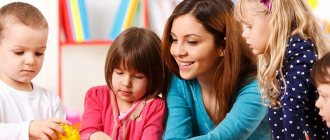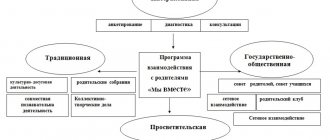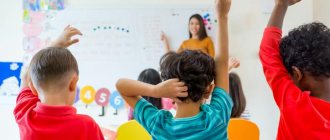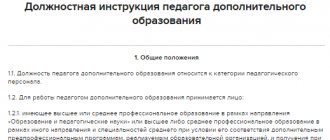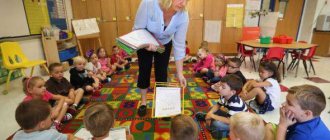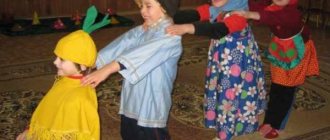Plan of interaction with families of pupils
Plan of interaction with families of pupils
for
the 20/19/2020 academic year
| Main part | Variable part* | ||||||||||
| Planned events varied focus and content | Thematic events | National-cultural component | ECE component** | ||||||||
| date | Direction, theme, content | Form of conduct | date | Direction, theme, content | Form of conduct | Educational area within which the event is being implemented | |||||
| 1 | 2 | 3 | 4 | 5 | 6 | 7 | 8 | 9 | |||
| September | |||||||||||
| Compilation socio-demographic passport of families | Questioning, testing | General theme for the period August 15 – September 1 “Knowledge Day” | |||||||||
| We are future schoolchildren | |||||||||||
| “Gifts for first-graders from kids” | Workshop for children, parents, teachers | “Socio-communicative development”, “Artistic and aesthetic development” | |||||||||
| "School line" | Visit to the line dedicated to September 1 by parents, children and teachers | “Cognitive development”, “Socio-communicative development” | |||||||||
Continuation of the table.
| 1 | 2 | 3 | 4 | 5 | 6 | 7 | 8 | 9 |
| “How to effectively prepare a child for school” | Consultation | “Cognitive development”, “Socio-communicative development” | ||||||
| Kindergarten mode | Information in the parent corner | Favorite kindergarten | ||||||
| "Child in kindergarten" | Information stand for parents | "Social and communicative development" | ||||||
| Tasks of development and education of children 5–6 years old | Parent meeting | "Let's make the kindergarten beautiful" | Campaign for kindergarten staff and parents to improve group premises | "Social and communicative development" | ||||
| Questioning to identify parental attitudes in education | Who meets us in kindergarten? | |||||||
| "Our adult friends and mentors" | Media presentations of kindergarten employees for children and parents in the parents’ club | “Cognitive development”, “Socio-communicative development” | ||||||
| "Favorite teacher" | Competition of professional skills with feasible participation of parents and students | “Cognitive development”, “Socio-communicative development” | ||||||
Continuation of the table.
| 1 | 2 | 3 | 4 | 5 | 6 | 7 | 8 | 9 | ||||
| General theme for the period September 11–30 “Autumn” | ||||||||||||
| Autumn time | ||||||||||||
| “Children’s health is in our hands” | Consultation workshop | An invitation to parents to compose a poem about autumn with their children and write it down | Competition for the best autumn poem | “Cognitive development”, “Socio-communicative development”, “Speech development” | ||||||||
| Individual counseling for parents on issues of upbringing, development and education of children based on work in the “Mailbox” group | An invitation to parents to make herbariums, ekibans, and crafts from natural materials with their children on the theme “Autumn” | Homework for parents, involvement in joint activities with children | "Cognitive Development" "Artistic and aesthetic development" | |||||||||
| Joint creation of a program for interaction between kindergarten and family in the problematic field of educating preschool children | Making with parents photo collage on the theme “Autumn in the forest (park, near a pond)" | Family photo competition | “Cognitive development”, “Socio-communicative development”, “Artistic and aesthetic development” | |||||||||
| "Sports games for older preschoolers" | "Screen for parents" | People's work in autumn | ||||||||||
| "Vegetable and fruit homemade dishes" | Diet nurse consultation for parents | “Physical development”, “Cognition” | ||||||||||
Continuation of the table.
| 1 | 2 | 3 | 4 | 5 | 6 | 7 | 8 | 9 |
| creative development" | ||||||||
| Child agricultural labor | Conversations with parents | “Cognitive development”, “Physical development” | ||||||
| Introducing parents to logic games recommended for playing with children of senior preschool age | “Edible and inedible mushrooms: how to distinguish, where to collect? First aid for poisoning with inedible mushrooms" | The doctor's consultation | “Cognitive development”, “Physical development” | |||||
| "Advice from Doctor Aibolit" | Health promotion | Nature on planet Earth | ||||||
| “Rules of behavior for children and adults in nature” | Booklets for parents | “Cognitive development”, “Physical development” | ||||||
| “Model of the ecosystem of the native land” | Competition of three-dimensional models of ecosystems made by children and parents | “Cognitive development”, “Socio-communicative development”, “Artistic and aesthetic development” | ||||||
Continuation of the table.
| 1 | 2 | 3 | 4 | 5 | 6 | 7 | 8 | 9 |
| Involving parents (if desired) to provide all possible assistance in preparing the kindergarten territory for winter (digging up plants, removing dry leaves, pruning branches etc.) | Recommendations for parents take a walk in the forest and provide all possible assistance to the forest: remove garbage, fence off an anthill, “treat” a broken tree | Conversations with parents | “Cognitive development”, “Socio-communicative development” | |||||
| October | ||||||||
| Consultation for parents on the topic “Children’s deceit.” Purpose: to introduce the causes, mechanisms and ways of the emergence and development of deceit in children; give practical recommendations for preventing and correcting children's deceit | General theme for the period October 1–15 “I will grow up healthy” | |||||||
| I want to be healthy | ||||||||
| "We are future Olympians" | Family sports competition | “Physical development”, “Socio-communicative development” | ||||||
| My parents | ||||||||
| "My Parents' Professions" | Organized educational activities with the participation of parents | “Cognitive development”, “Socio-communicative development” | ||||||
Continuation of the table.
| 1 | 2 | 3 | 4 | 5 | 6 | 7 | 8 | 9 | ||||||
| Working together: a family workshop | Repairing children's furniture, sewing clothes for dolls | The general theme for the period October 16 – November 4 is “National Unity Day” | ||||||||||||
| Home country | ||||||||||||||
| Involving parents and residents of the nearest microsociety in the campaign “Let's make our hometown (village) cleaner” | “Physical development”, “Socio-communicative development” | |||||||||||||
| A conversation between a psychologist and parents on the topic “Children’s shyness.” Goal: to help parents understand the nature, mechanisms and ways of the emergence and development of childhood shyness; offer practical techniques for overcoming childhood shyness | Competition for parents and residents of the nearest microsociety “Do-it-yourself small sculptural forms as a gift to your hometown (village)” | “Physical development”, “Socio-communicative development” | ||||||||||||
| Festival “Multinational Russia” with the participation of parents, children, residents of the nearest microsociety of various nationalities | “Socio-communicative development”, “Cognitive development” | |||||||||||||
| Competition of creative works “Heroes of Russia”. Goal: to attract the attention of parents to the moral and patriotic education of children through various methods and methods | "Artistic and aesthetic development" "Cognitive Development" | |||||||||||||
| Moscow is the capital of our homeland | ||||||||||||||
| "Trip around Moscow" | Family project | "Cognitive Development" | ||||||||||||
Continuation of the table.
| 1 | 2 | 3 | 4 | 5 | 6 | 7 | 8 | 9 |
| “Social and communicative development”, “Artistic and aesthetic development”, “Speech development” | ||||||||
| November | ||||||||
| “How to dress a child in the cold season” | Subgroup consultations | General theme for November 5–15 “Nature corner in kindergarten” | ||||||
| Taking care of indoor plants | ||||||||
| "Miracle Doctor" | Competition for the best houseplant grown by parents for kindergarten | “Socio-communicative development”, “Cognitive development” | ||||||
| Inhabitants of the living corner | ||||||||
| "Young Actors" | Theater living room | "Do it yourself aquarium" | Competition for the best craft (fish, aquariums, algae from waste material) | "Artistic and aesthetic development" | ||||
| December | ||||||||
| "Let's think together..." | Solving pedagogical problems with parents | General theme for November 16 – December 31 “New Year” | ||||||
| What is a holiday? | ||||||||
| “Traditions of celebrating the New Year in different countries” | Consultation | “Cognitive development”, “Social- | ||||||
Continuation of the table.
| 1 | 2 | 3 | 4 | 5 | 6 | 7 | 8 | 9 |
| "Beauty Christmas Tree" | Activities for the implementation of a child-adult project | communicative development" "Cognitive Development" | ||||||
| "What to do child at home on holidays? | Consultation for parents | We are preparing for the new year | ||||||
| “Let’s decorate the group for the holiday” | Competition among parents for the best group decoration | "Artistic and aesthetic development" | ||||||
| “Project activities in kindergarten” | School for parents | New Year presents | ||||||
| “Let’s make gifts for those closest to us” | Creative workshop | “Socio-communicative development”, “Artistic and aesthetic development” | ||||||
| "Holiday table for your child" | Consultation with a nutritionist | New Year's party | Role-playing participation of parents in children's New Year's party | “Socio-communicative development”, “Artistic and aesthetic development” | ||||
| January | ||||||||
| Selection of a family reading library “Parenting Tips” | General theme for January 1–31 “Winter” | |||||||
| Zimushka-winter | ||||||||
Continuation of the table.
| 1 | 2 | 3 | 4 | 5 | 6 | 7 | 8 | 9 |
| “Winter has come and brought a lot of snow” | Excursion with parents and the children to the park | “An interesting and exciting winter walk with a child” | Conversation with parents | “Cognitive development”, “Socio-communicative development” | ||||
| Effective means and methods of hardening | Workshop for parents | We are athletes | ||||||
| Organization of winter sports games, fun and entertainment for children and parents during an evening walk in kindergarten. Goal: to unite children and parents with common fun and games, to show practical ways to organize children's winter games | "Physical development" | |||||||
| "Problems in the relationship between parents and children" | Consultation | Winter wonders | ||||||
| "Experimental activities of older preschoolers" | Consultation for parents | "Cognitive Development" | ||||||
| February | ||||||||
| "Child and computer: pros and cons" | Reminders for parents | General theme for the period February 1–23 “Defender of the Fatherland Day” | ||||||
| Our army | ||||||||
| Drawing up instructions for fathers on the topic “Simple tips and rules for raising children.” Purpose: to provide assistance | “Who did my dad serve in the army?” | Stories from fathers for children at a themed event | “Socio-communicative development”, “Cognitive development” | |||||
Continuation of the table.
| 1 | 2 | 3 | 4 | 5 | 6 | 7 | 8 | 9 | ||||
| fathers in some aspects of raising children | "Word to mouth." Stories from fathers for children about family war stories that glorified the family | "Social and communicative development" | ||||||||||
| "We play with dad" | Festival of outdoor games | Future defenders of the Motherland | ||||||||||
| "Poems about the Motherland" | Poetry evening with parents | "Speech development" | ||||||||||
| "Future Defenders of the Motherland" | Competition of paramilitary games and relay races for children and parents | “Cognitive development”, “Socio-communicative development”, “Physical development” | ||||||||||
| Parents making posters and drawings “My Family Tree” | The general theme for the period February 24 – March 8 is “International Women’s Day” | |||||||||||
| Preparation for the holiday | ||||||||||||
| “All kinds of mothers are important, all kinds of mothers are needed!” | Thematic educational activities with the participation of group mothers | "Social and communicative development" | ||||||||||
| "How to raise children have love to your family, mother? | Conversation with parents | Gifts for the holiday | ||||||||||
| "Skillful Hands" | Making gifts for mothers and grandmothers together with dads | “Socio-communicative development”, “Artistic and aesthetic development” | ||||||||||
Continuation of the table.
| 1 | 2 | 3 | 4 | 5 | 6 | 7 | 8 | 9 |
| March | ||||||||
| “How to develop creative abilities in a child?” | Parent meeting | General theme for the period March 9–31 “Folk culture and traditions” | ||||||
| Folk toy | ||||||||
| Folklore festival “Fair” for children, parents, teachers and residents of the nearest microsociety | "Artistic and aesthetic development" | |||||||
| Compiling a library of Russian folk tales and nursery rhymes to help parents | Folk culture | |||||||
| Creation of museums and mini-museums of Russian life and folk utensils | “Artistic and aesthetic development”, “Cognitive development” | |||||||
| “Simple safety rules for adults and children” – booklets for parents | Arts and crafts | |||||||
| “Together to the museum (exhibition) of folk art” | Weekend route | “Cognitive development”, “Artistic and aesthetic development”, “Social and communicative development” | ||||||
| April | ||||||||
| Presentation “Piggy banks add- | Evening meeting with parents | General theme for the period March 21 – April 15 “Spring” | ||||||
Continuation of the table.
| 1 | 2 | 3 | 4 | 5 | 6 | 7 | 8 | 9 |
| a lot of things." Goal: exchange of experience of moral education in the family | lyami | “Spring is coming towards us with quick steps...” | ||||||
| "Walks in the open air". Goal: to familiarize parents with methods and practical recommendations for organizing outdoor walks | Individual communication | "Cognitive Development" "Physical development" | ||||||
| Memos for parents: “How to behave in nature?”, “What should I take with me on a hike?” | Living and inanimate nature. Labor in spring | |||||||
| “Let’s make a birdhouse with our own hands” | Family promotion | "Physical development", "Cognitive development" | ||||||
| Conversation with parents on the topic: “What does the concept of “morality” mean today? How to raise a child to be a moral person? | General theme for the period April 16 – May 9 “Victory Day” | |||||||
| Heroes of the Second World War | ||||||||
| “We honor our native history” | Children and parents going to the library to look for information about the heroes of the Second World War | "Cognitive Development" "Social and communicative development" | ||||||
| “We will help a lonely elderly person.” Goal: to unite children and re- feeding adults in general business, to lay the foundations of kindness and morality in children | Promotion of children, parents and kindergarten staff | "Social and communicative development" | ||||||
End of table.
| 1 | 2 | 3 | 4 | 5 | 6 | 7 | 8 | 9 |
| Selection for parents of a family reading library on the topic “Children about the Second World War” | Monuments to the heroes of the Second World War | |||||||
| Excursion of children and parents to monuments to the heroes of the Second World War, to places of battles and military glory | "Cognitive Development" "Social and communicative development" | |||||||
| May | ||||||||
| "Health without drugs" | Reminders for parents | General theme for the period May 10–31 “Summer” | ||||||
| Summer is red | ||||||||
| "The sun is our friend" | Consultation for parents | "Cognitive Development" | ||||||
| Nature blossoms | ||||||||
| “Poisonous plants of our region” | Reminders for parents | "Cognitive Development" | ||||||
| "The whole family to the stadium" | Reminders-booklets for parents | "Nature of the native land" | Photo exhibition | "Cognitive Development" | ||||
Program for interaction between family and preschool educational institutions at the present stage
- November 11, 2012
Competition “My Pedagogical Initiative - 2012”
Nomination “Methodological work in preschool educational institutions”
Today, a new system of preschool education is being established in society. On November 23, 2009, by Order of the Ministry of Education and Science of the Russian Federation No. 655 (registered by the Ministry of Justice of Russia on February 8, 2010 No. 16299), federal state requirements for the structure of the basic general education program of preschool education (hereinafter referred to as FGT) were approved.
The concept of modernization of Russian education emphasizes the exclusive role of the family in solving the problems of educating the younger generation. Recognition of the priority of family education requires other forms of interaction between family and kindergarten.
The interaction between kindergarten and family is one of the priorities in the work of the Municipal Preschool Educational Institution Child Development Center - Kindergarten No. 10 in the city of Alekseevka, Belgorod Region. Since teachers play a certain role in establishing partnerships, this is not the first year that kindergarten has included the task of working with families in the annual plan. And this gives positive results - teachers began to more often use non-traditional forms in working with children: tea parties, joint craft competitions, creativity marathons. But not all teachers easily switch to new forms of work.
For the last three years, a club for parents has been operating at the base. This form of working with parents is more effective and efficient than the parent meeting. Throughout the year, holidays and entertainment in the pool and musical matinees are held for parents. The annual holding of sports competitions “Dad, Mom, Me – a Sports Family” has become a good tradition of the kindergarten. We involve parents in helping to improve the territory and replenish the subject-development environment. But, along with the positive dynamics, the analysis of the interaction between the preschool educational institution and the family showed significant shortcomings in the work:
- The content of parent meetings and consultations is not sufficiently differentiated.
- When interacting with a student’s family, the capabilities and conditions of specific families and their interests are not taken into account.
- Not enough parents are involved in the work of preschool educational institutions.
After assessing parents’ satisfaction with the work of preschool educational institutions, it was decided to provide a meaningful description of their priorities in pedagogical literacy, and the results of the survey showed that the leading motives for increasing their pedagogical literacy are: increasing the level of psychological and pedagogical knowledge; solving problems of upbringing and education of children.
Thus, the analysis indicates the need for innovations in cooperation with parents. It is necessary to develop and implement a work system for the active inclusion of parents in the management of preschool educational institutions. All this allows us to consider working with parents as one of the pressing problems of preschool educational institutions at the present stage of modernization of the education system.
The socio-economic transformations characteristic of Russia in recent years have dramatically changed the goals and objectives facing education. The processes of democratization in the education system, its variability, and innovative programs have determined the need to find solutions to the problems of interaction between kindergarten and family, and to create conditions for improving the pedagogical culture of parents. During the research, the following contradictions :
- Between the rights and responsibilities of parents and the inability to use them.
- Between the need of parents for educational services and the lack of conditions for their provision.
- Between the low level of pedagogical culture of parents and the lack of a system for teaching them in kindergarten.
- Strengthening and developing close connections and interaction between various social institutions provides favorable living conditions and upbringing of a child, forming the foundations of a full-fledged, harmonious personality.
At the present stage, the basis for the joint activities of kindergarten and family is the following principles :
- Parents and teachers are partners in the upbringing and education of children.
- A common understanding by teachers and parents of the goals and objectives of raising and educating children.
- Help, respect and trust in the child, both from teachers and from parents.
- Constant analysis of the process of interaction between family and kindergarten, its intermediate and final results;
The Law “On Education” of the Russian Federation states that parents are the first teachers. They are obliged to lay the foundations for the physical, moral, intellectual, and personal development of the child. Working with parents is a complex and important part of a teacher’s activity, including increasing the level of parents’ pedagogical knowledge, skills, and teachers’ assistance to parents in family education.
Our proposed concept for the program of interaction between preschool educational institutions and families is developed in accordance with the following principles:
- The concept reflects the main directions of state policy in the field of education in accordance with the Law of the Russian Federation “On Education”, with the regulatory documents of the education department of the municipality, the Charter of MDOU d/s No. 10;
- The concept covers such aspects of improving preschool educational institutions as: educational and educational; scientific and methodological; organizational and managerial.
The initiative in establishing interaction with the family and the qualified implementation of the tasks of this interaction determines the guiding role of the preschool institution in family education. The most important way to implement cooperation between teachers and parents is to organize their joint activities, in which parents are not passive observers, but active participants in the process, that is, the inclusion of parents in the activities of preschool educational institutions.
Main priorities and directions of the program:
1. Unity in the work of the kindergarten and family in the upbringing and education of children.
2. Mutual trust in the relationship between teachers and parents, understanding of the needs and interests of the child.
3. Establishing correct relationships based on friendly criticism and self-criticism.
4. Mutual assistance in working together to educate preschoolers.
5. Studying the best experience of family education, promoting it among a wide range of parents, using the positive experience of family education in the work of the kindergarten.
6. Involving parents and the public in the activities of preschool educational institutions and in working with families.
7. Creating favorable conditions for increasing the pedagogical and psychological literacy of parents in the upbringing and education of preschool children.
8. Involving parents of “disorganized children” of the district in cooperation with preschool educational institutions.
9. Pedagogization of the preschool educational institution region.
10. Creation of a package of regulatory documents ensuring the rights of children.
Program events.
Priority activities with parents:
1. Social anemnesis of the family.
2. Drawing up and filling out a socio-demographic family passport.
3. Questionnaire to identify the level of teaching capabilities of parents.
4. Analysis of socio-pedagogical factors in family education of children.
5. Analysis of types of families of pupils.
6. Determination of parenting styles in the family.
7. Determination of the pedagogical competence of parents
Priority activities with teachers:
1. Questionnaire for educators “My pros and cons” in communicating with parents.
2. Test surveys of teachers.
3. Self-analysis of the behavior of a collective meeting with parents.
Methods of involving parents in the activities of preschool educational institutions:
Stage I: updating the needs of parents in the field of education of their own child.
Stage II: pedagogical education of parents as customers for educational services in preschool educational institutions.
Stage III: partnership between teachers and parents in the activities of preschool educational institutions, which is based on the ideas of humanizing relationships, the priority of universal human values with an emphasis on a personal-active approach.
Basic blocks for working with parents
| Blocks | Main goals | Forms |
| Pedagogical education of parents | Increasing the pedagogical competence of parents | Lectures, seminars, workshops, parent meetings, consultations, conferences and so on |
| Inclusion of parents in the activities of preschool educational institutions | Creating conditions for the inclusion of parents in planning, organizing and monitoring the activities of preschool educational institutions | Competitions, clubs, contests, quizzes, joint events, open days |
Algorithm for interaction with family:
Stage I. Searching for contacts at the first meeting - the teacher must show high pedagogical tact, sincere respect for parents, delicacy, restraint, it is important not to push away with ill-considered questions.
Stage II. It is discussed what is necessary to develop and educate a child, to emphasize his individuality and uniqueness. At this stage, you can already carefully talk about unwanted manifestations in the baby’s behavior.
Stage III. Establishing general requirements for raising a child. The teacher encourages parents to express their views on raising a child, to listen to the parents’ opinion about the methods they use, even if it is wrong. He does not refute, but offers his own methods of influence, calls for joint efforts to develop common demands.
Stage IV. Strengthening cooperation in achieving a common goal. Having agreed to joint cooperation, the parties clarify each other’s educational capabilities and set common goals and objectives. Disputes and disagreements are possible. It is important that they do not interfere with further cooperation.
V stage. Implementation of an individual approach. The teacher does not demonstrate his omnipotence, but confidentially communicates his doubts and difficulties, asks for advice from parents and listens to them. At this stage, a number of agreed measures are developed, including the re-education of the child.
VI stage. Improving pedagogical cooperation. Ready-made recipes are not offered; the process of joint activities is carefully analyzed. This is the stage of development of pedagogical cooperation, where common pedagogical influences are being implemented.
The initiator of contact is always the teacher!
Specific expected results:
At the final stage of introducing the program into the work of the kindergarten, it will provide an opportunity to activate parents, which will contribute to the establishment of a dialogue between the preschool educational institution and the family. This will provide an opportunity to form an active parental position, update acquired knowledge, and help parents look at specific situations through the eyes of their children and understand them.
The program will help to understand the attitude of teachers towards cooperation with parents; they will feel the need for constant growth of professional skills, level of self-education, and erudition.
The use of non-traditional forms of work with parents will increase the level of parental involvement in the educational process of preschool educational institutions. The implementation of this program will also help to establish warm, friendly relationships between children, teachers, and parents.
Thanks to this program, the level of psychological and pedagogical knowledge of parents and parental competence will increase.
Socially significant resonance of the program
The family is a social institution of education; it carries out the continuity of generations and the socialization of children. In the family, children gain their first experience of understanding the world around them and learn to communicate. Therefore, the priority of supporting family education, psychological and pedagogical support for the family has been and will be relevant throughout the entire development of society. Public involvement in the problems of development and education of the younger generation will increase. The government must turn its attention to education.
Literature:
- Berezina V.A., Vinogradova L.I. Volzhina O.I. Pedagogical support of family education: Parental education programs. St. Petersburg: Karo, 2005
- Zvereva O.L., Krotova T.V. Parent meetings in preschool educational institutions: methodological manual. M.: Iris Press, 2006.
- Kozlova A.V., Desheulina R.P. Work of preschool educational institutions with families: diagnosis, planning, lecture notes, consultations, monitoring. M.: Creative Center, 2004.
Author: Svetlana Vasilievna Berestovaya, psychologist, MDOU CRR - kindergarten No. 10, Alekseevka, Belgorod region, work experience 9 years; Soboleva Marina Vladimirovna, teacher of the Children's Education and Recreation Center - kindergarten No. 10, Alekseevka, Belgorod region, work experience 2 years.
